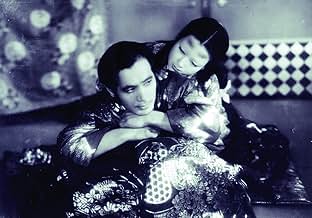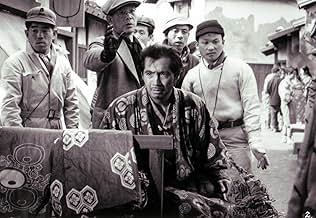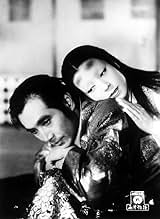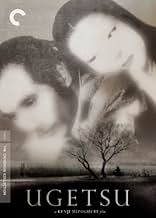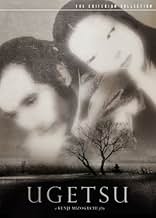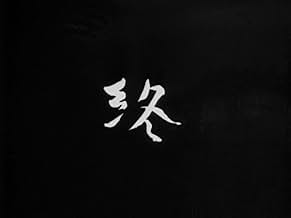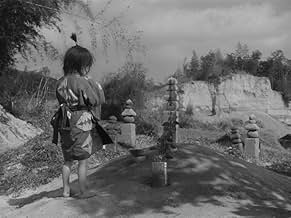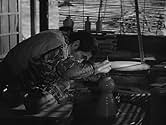CALIFICACIÓN DE IMDb
8.1/10
27 k
TU CALIFICACIÓN
Ambición, familia, amor y guerra ambientada en medio de las guerras civiles japonesas del siglo XVI.Ambición, familia, amor y guerra ambientada en medio de las guerras civiles japonesas del siglo XVI.Ambición, familia, amor y guerra ambientada en medio de las guerras civiles japonesas del siglo XVI.
- Dirección
- Guionistas
- Elenco
- Nominado a 1 premio Óscar
- 6 premios ganados y 2 nominaciones en total
Eitarô Ozawa
- Tôbei
- (as Sakae Ozawa)
Opiniones destacadas
This was my first Mizoguchi movie, so perhaps I watched it a little with child´s eyes. I liked it very much - it´s more fast-paced than I would expect from Japanese filmmaking. Mizoguchi is indeed a visual poet, the visual composition of every sequence looks as have been carefully planned, with much more importance given to imagery rather than dialogue. "Ugetsu" main themes, I believe, are the submission of women on feudal Japan - the transformation of the lives of the wifes of the two pottery dealers is treated very handsomely, each one striving to lead a decent life after being abandoned by their husbands, but failing in the end. The boat scene, with the encounter of a dying man, is also very beautiful. It´s a major turning point in the film, similar to a scene in Kurosawa´s "Throne of Blood" (mist, swamp, incertainty...)
'Ugetsu' is a Japanese film directed by Kenji Mizoguchi based on stories in Ueda Akinari's book titled Ugetsu Monogatari. At the basic level, this is a story about survival during the Japanese Civil Wars in the late 16th century. The film follows two married couples namely Genjurō and Miyagi, Tōbei and Ohama of the Ōmi Province. They get uprooted along with a lot of other families when their village gets attacked by Shibata Katsuie's army. Genjurō being a potter decides to go to Ōmizo to sell his wares to earn money. He goes to Ōmizo with Tōbei and Ohama while Miyagi decides to stay back and take care of Genichi(Miyagi and Genjurō's son). While in Ōmizo, Genjurō gets attracted to the mysterious and enigmatic Lady Wakasa and becomes overwhelmed by his interest in her, and Tōbei, who was always a bit of a delusional dimwit, gets more and more inclined towards living the life of a samurai and show-off his bravery and strength. Tōbei ends up seeking out Samurai soldiers leaving his wife Ohama alone and helpless during chaotic wartime.
Along with 'Rashomon', 'Ugetsu' is considered by many critics to be the film that opened doors for Japanese cinema in the western world and gave the cinema in Japan a global exposure. Like 'Rashomon', this film was also based on Japanese folk tales, but Mizoguchi's humanist filmmaking made it relevant for the 1950s and its relevance hasn't waned at all in the last 50 years. 'Ugetsu' belonged to a whole line of films that got released after WWII along with 'Rashomon', 'The Bicycle Thief', 'The Planes are Flying', 'Ivan's Childhood', etc. which looked at war in a critical way instead of glorifying. They critiqued the very purpose of war by brutally depicting its devastating consequences. Although 'Ugetsu' is set in 16th century Japan during the Japanese Civil War, for me it clearly is an allegory for Japanese society during WWII and the allegory here is a lit bit more overt and obvious than the same in 'Rashomon'.
This can surely be seen as a feminist film. We see the men fall prey to puerile ambitions and greed, while the women are left helpless and asked to fend for themselves during a time of war when they are more prone to danger and harm with ravenous and wild warriors running around everywhere. But the women in the film do what they have to do without showing any fear and without accepting defeat. After watching this film, I don't think it is possible for anyone to not fall completely in love with the character of Miyagi. She has unconditional love for her husband Genjurō and their son Genichi. She does whatever she has to, to make sure her son survives under difficult, harsh conditions, when Genjurō was spending time with Lady Wasaka. This film shows the hopeless nature of gender inequality that existed in medieval Japan and how women were extremely vulnerable.
The film as I mentioned before is an allegory for the Japanese society and the Japanese political system in the WWII era. Like Tōbei, some men are too drawn to the idea of power and will go to any lengths to prove to others that they are powerful by engaging in pointless fights. Genjurō represents those people who being led by unrestricted greed want to utilise war in their own way by making use of people's troubles to fill up their pockets. Lady Wasaka is very mysterious and interesting character. She is a very Mephistopheles- like character who lures Genjurō into her world by promising him eternal happiness, wealth and love. The Faust-esque Genjurō falls for her and abandons his own family. If the people sitting on thrones are led by the greed for power and the greed for lust and wealth, it can sometimes lead to irreparable damage to their country and its people. This might sound preachy, but the film presents this through the screenplay instead of blatant sermons. The film is also a commentary on the disappearance of Buddhist ideals and principals in modern Japanese society.
Along with Mizoguchi's style of storytelling, one can't help but admire the skill of his camera work. The film has many beautiful wide shots which serve both purposes - beauty as well as thematic relevance. There are some seamless transitions from one scene to another. Mizoguchi also beautifully builds tension and sets a Gothic creepy atmosphere in certain scenes which lends the film a genuine horror element. However, 'Ugetsu' like 'Rashomon' ends in a very optimistic and emotional note.
'Ugetsu' is a film whose importance and significance in film history can never be questioned. It is an artistic allegory of life during wartime. As long as the concept of war exists in human society, this film will continue to have significant relevance.
Along with 'Rashomon', 'Ugetsu' is considered by many critics to be the film that opened doors for Japanese cinema in the western world and gave the cinema in Japan a global exposure. Like 'Rashomon', this film was also based on Japanese folk tales, but Mizoguchi's humanist filmmaking made it relevant for the 1950s and its relevance hasn't waned at all in the last 50 years. 'Ugetsu' belonged to a whole line of films that got released after WWII along with 'Rashomon', 'The Bicycle Thief', 'The Planes are Flying', 'Ivan's Childhood', etc. which looked at war in a critical way instead of glorifying. They critiqued the very purpose of war by brutally depicting its devastating consequences. Although 'Ugetsu' is set in 16th century Japan during the Japanese Civil War, for me it clearly is an allegory for Japanese society during WWII and the allegory here is a lit bit more overt and obvious than the same in 'Rashomon'.
This can surely be seen as a feminist film. We see the men fall prey to puerile ambitions and greed, while the women are left helpless and asked to fend for themselves during a time of war when they are more prone to danger and harm with ravenous and wild warriors running around everywhere. But the women in the film do what they have to do without showing any fear and without accepting defeat. After watching this film, I don't think it is possible for anyone to not fall completely in love with the character of Miyagi. She has unconditional love for her husband Genjurō and their son Genichi. She does whatever she has to, to make sure her son survives under difficult, harsh conditions, when Genjurō was spending time with Lady Wasaka. This film shows the hopeless nature of gender inequality that existed in medieval Japan and how women were extremely vulnerable.
The film as I mentioned before is an allegory for the Japanese society and the Japanese political system in the WWII era. Like Tōbei, some men are too drawn to the idea of power and will go to any lengths to prove to others that they are powerful by engaging in pointless fights. Genjurō represents those people who being led by unrestricted greed want to utilise war in their own way by making use of people's troubles to fill up their pockets. Lady Wasaka is very mysterious and interesting character. She is a very Mephistopheles- like character who lures Genjurō into her world by promising him eternal happiness, wealth and love. The Faust-esque Genjurō falls for her and abandons his own family. If the people sitting on thrones are led by the greed for power and the greed for lust and wealth, it can sometimes lead to irreparable damage to their country and its people. This might sound preachy, but the film presents this through the screenplay instead of blatant sermons. The film is also a commentary on the disappearance of Buddhist ideals and principals in modern Japanese society.
Along with Mizoguchi's style of storytelling, one can't help but admire the skill of his camera work. The film has many beautiful wide shots which serve both purposes - beauty as well as thematic relevance. There are some seamless transitions from one scene to another. Mizoguchi also beautifully builds tension and sets a Gothic creepy atmosphere in certain scenes which lends the film a genuine horror element. However, 'Ugetsu' like 'Rashomon' ends in a very optimistic and emotional note.
'Ugetsu' is a film whose importance and significance in film history can never be questioned. It is an artistic allegory of life during wartime. As long as the concept of war exists in human society, this film will continue to have significant relevance.
In the beginning of the springtime in the period of the Japanese Civil Wars of the Sixteenth Century in Lake Biwa in the Province of Omi, the family man farmer and craftsman Genjurô (Masayuki Mori) travels to Nagahama to sell his wares and makes a small fortune. His neighbor Tobei (Sakae Ozawa) that is a fool man dreams on becoming a samurai, but he can not afford to buy the necessary outfit. The greedy Genjurô and Tobei work together manufacturing clay potteries, expecting to sell the pieces and enrich; however, their wives Miyage (Kinuyo Tanaka) and Ohama (Mitsuko Mito) are worried about the army of the cruel Shibata that is coming to their village and they warn their ambitious husbands. Their village is looted but the families flee and survive; Genjurô and Tobei decide to travel by boat with their wives and baby to sell the wares in a bigger town. When they meet another boat that was attacked by pirates, Genjurô decides to leave his wife and son on the bank of the river, promising to return in ten days. Genjurô, Tobei and Ohama raise a large amount but Tobei leaves his wife to buy the samurai outfit and seek fame and fortune. Meanwhile the female aristocratic Lady Wakasa (Machiko Kyô) and her servant ask Genjurô to bring her shopping to her fancy Kutsuki House. Sooner Genjurô and Tobei discover the price they have to pay for their ambition.
"Ugetsu Monogatari" is the first movie that I have watched of Kenji Mizoguchi and I am impressed with this masterpiece. This supernatural story is very well constructed in a historic context of the Japanese Civil Wars of the Sengoku period, with two family dramas caused by the blindness of greed. This feature is supported by a magnificent cinematography in black and white, and the scene in the foggy lake is a piece of art. The performances are awesome, and the cast really seems to be living in the Sixteenth Century in Japan. My vote is nine.
Title (Brazil): "Contos da Lua Vaga" ("Tales of the Vague Moon")
"Ugetsu Monogatari" is the first movie that I have watched of Kenji Mizoguchi and I am impressed with this masterpiece. This supernatural story is very well constructed in a historic context of the Japanese Civil Wars of the Sengoku period, with two family dramas caused by the blindness of greed. This feature is supported by a magnificent cinematography in black and white, and the scene in the foggy lake is a piece of art. The performances are awesome, and the cast really seems to be living in the Sixteenth Century in Japan. My vote is nine.
Title (Brazil): "Contos da Lua Vaga" ("Tales of the Vague Moon")
10lwalsh
Having read much about this film, I thought I knew what to expect when I finally had the chance to see it. I was wrong; no amount of writing can convey the richness and impact of the images and the overall flow of the film-- which is why this commentary will be brief. Suffice it to say that I recommend this film wholeheartedly to anyone looking for cinematic poetry (though not, probably, to those who, misled by its being set during the Japanese Civil Wars, expect an action film).
Perhaps the most striking thing about the film is the camera-work; on a first viewing one is scarcely aware of it much of the time, but the camera is in constant motion, emblematic of the restlessness which pervades not only the era and the central characters but, by implication, all of human life (in this regard, it's a very Buddhist film). This movement is never gratuitous; when the scene demands little or no movement the camera stays still. Notice, though, how often the camera's movement enhances the emotional impact of the scene, especially in the famous panning shot (not, as occasionally described, a 360 degree shot) of the reunion near the end. Along with this is Mizoguchi's penchant for long takes, which seduce the viewer into the rhythm of the film without calling attention to themselves or to his cleverness as a director.
But these are technical comments which may or may not be helpful in focussing a viewer's attention; what really matters is the film itself as a whole. It is truly beautiful, and powerful in the unexpected way of great poetry. Technique and emotion, simplicity of means and complexity of effects, walk hand-in-hand here, and the result is remarkable in a way which film rarely attains.
Perhaps the most striking thing about the film is the camera-work; on a first viewing one is scarcely aware of it much of the time, but the camera is in constant motion, emblematic of the restlessness which pervades not only the era and the central characters but, by implication, all of human life (in this regard, it's a very Buddhist film). This movement is never gratuitous; when the scene demands little or no movement the camera stays still. Notice, though, how often the camera's movement enhances the emotional impact of the scene, especially in the famous panning shot (not, as occasionally described, a 360 degree shot) of the reunion near the end. Along with this is Mizoguchi's penchant for long takes, which seduce the viewer into the rhythm of the film without calling attention to themselves or to his cleverness as a director.
But these are technical comments which may or may not be helpful in focussing a viewer's attention; what really matters is the film itself as a whole. It is truly beautiful, and powerful in the unexpected way of great poetry. Technique and emotion, simplicity of means and complexity of effects, walk hand-in-hand here, and the result is remarkable in a way which film rarely attains.
In Japan, due to its Buddhism and Shinto culture, the term Ghost is an description for evil of the spirits world. and the idea of spirits which dispatch from its physical body are describe as phamton. from the difference associate with these 2 terms we can understand that even in spirits there is description for the good and bad spirits. this is similar to the Chinese mythology for ghost. even if the spirits was wrongly accused, and coming back to human world for its revenge, this is still consider as an spirits rather than ghost, as it has its positive of motive and would not harm people who is not associate with his death. since spirits normally does not appear in the human world, and its appearance often associate with unfinished matter or grudge. which is the main characteristic for most of the Japanese film.
the most impressive Japanese ghost story is Ugetsu monogatari(1953), it was base on the novel with the same title. we can analysis the idea of Japanese ghost film via 2 aspect of the film.
Firstly, while Genjuro was selling pottery in the market, he was been order by Lady Wakasa and its nurse maid to send the good to their mansion personally, which was the starting point of ghostly love relationship.
By the hand of prestige cinema photographer, Kuzo Miyagawa, the mystic atmosphere, the trembling music of sanmise, the ghostly voice of men grudging, gives the mansion an appeal of a haunted mansion. The use of top view camera technique with the character Noh play like appeal,gives the scene much more mysterious, secluded, ghostly, euphoria aspect of the fantasy world. which above all explores the art of Japanese traditional beauty.although it is an black and white film, but Kuzo Miyagawa create an color of bewitch ghostly character on Lady Wakasa.
The very motive for the existence of Lady wakasa was to have a taste of love, as she was kill before she can understand what love is, after resurrect by the nursemaid, she have become and spirits that looking for the ideal man to love. that is why she put a spell on Genjuro. to love not to hurt.
The second aspect for Genjuro associate with spirits was at the end part of the movie, while He push open the cripple door of his home, he saw an empty house, yet after the camera return an image of the room, Miyagi, Genjuro's wife appear, who was setting beside the stove alone tailoring clothes, and waiting for his husband to eat and change into comfy kimono, Genjuro feel extremely tire after all the events therefore he quickly falls asleep, next morning, when the villager master realize he is return went into his home and explain the tragic of her wife. and the disappearance of his son, coincidentally, his son returns in the very moment.
The movie finish with a long shot as the kid playing beside his mothers grave while Genjuro praying, which symbolize Miyagi has finally saw the father and son reunited and now he is able to rest in peace, and fly to heaven.
The movie demonstrate the childish, stubbornness and foolishness of male. yet it purify the females character as loving and sincere, which demonstrate no scary or horrifying intention to the viewer when associate with ghost. infect we associate with the idea of gentleness, shyness of its character. the eternal serenity towards the love one can only be associate with ghostly figure in a time transcend world.
the most impressive Japanese ghost story is Ugetsu monogatari(1953), it was base on the novel with the same title. we can analysis the idea of Japanese ghost film via 2 aspect of the film.
Firstly, while Genjuro was selling pottery in the market, he was been order by Lady Wakasa and its nurse maid to send the good to their mansion personally, which was the starting point of ghostly love relationship.
By the hand of prestige cinema photographer, Kuzo Miyagawa, the mystic atmosphere, the trembling music of sanmise, the ghostly voice of men grudging, gives the mansion an appeal of a haunted mansion. The use of top view camera technique with the character Noh play like appeal,gives the scene much more mysterious, secluded, ghostly, euphoria aspect of the fantasy world. which above all explores the art of Japanese traditional beauty.although it is an black and white film, but Kuzo Miyagawa create an color of bewitch ghostly character on Lady Wakasa.
The very motive for the existence of Lady wakasa was to have a taste of love, as she was kill before she can understand what love is, after resurrect by the nursemaid, she have become and spirits that looking for the ideal man to love. that is why she put a spell on Genjuro. to love not to hurt.
The second aspect for Genjuro associate with spirits was at the end part of the movie, while He push open the cripple door of his home, he saw an empty house, yet after the camera return an image of the room, Miyagi, Genjuro's wife appear, who was setting beside the stove alone tailoring clothes, and waiting for his husband to eat and change into comfy kimono, Genjuro feel extremely tire after all the events therefore he quickly falls asleep, next morning, when the villager master realize he is return went into his home and explain the tragic of her wife. and the disappearance of his son, coincidentally, his son returns in the very moment.
The movie finish with a long shot as the kid playing beside his mothers grave while Genjuro praying, which symbolize Miyagi has finally saw the father and son reunited and now he is able to rest in peace, and fly to heaven.
The movie demonstrate the childish, stubbornness and foolishness of male. yet it purify the females character as loving and sincere, which demonstrate no scary or horrifying intention to the viewer when associate with ghost. infect we associate with the idea of gentleness, shyness of its character. the eternal serenity towards the love one can only be associate with ghostly figure in a time transcend world.
¿Sabías que…?
- TriviaThe plot is a combination of two tales from the work of Ueda Akinari called "Tales of moon and rain".
- ErroresAfter the soldier cuts off the general's head there's no blood on his sword.
- ConexionesFeatured in De l'origine du XXIe siècle (2000)
Selecciones populares
Inicia sesión para calificar y agrega a la lista de videos para obtener recomendaciones personalizadas
- How long is Ugetsu?Con tecnología de Alexa
Detalles
Taquilla
- Total en EE. UU. y Canadá
- USD 11,197
- Fin de semana de estreno en EE. UU. y Canadá
- USD 6,154
- 5 mar 2017
- Total a nivel mundial
- USD 24,959
- Tiempo de ejecución
- 1h 36min(96 min)
- Color
- Relación de aspecto
- 1.37 : 1
Contribuir a esta página
Sugiere una edición o agrega el contenido que falta


